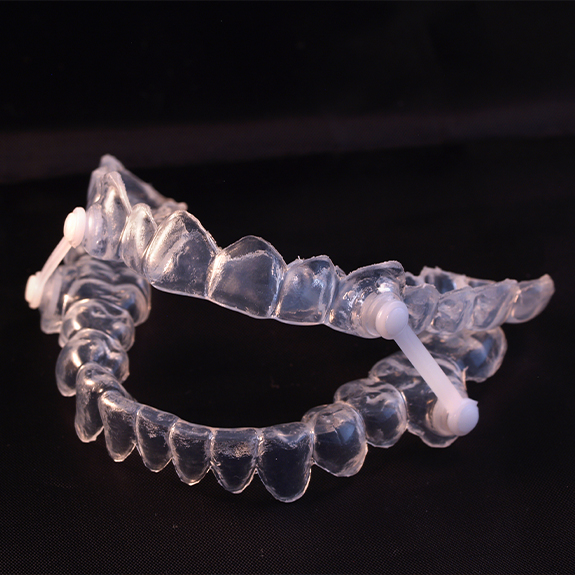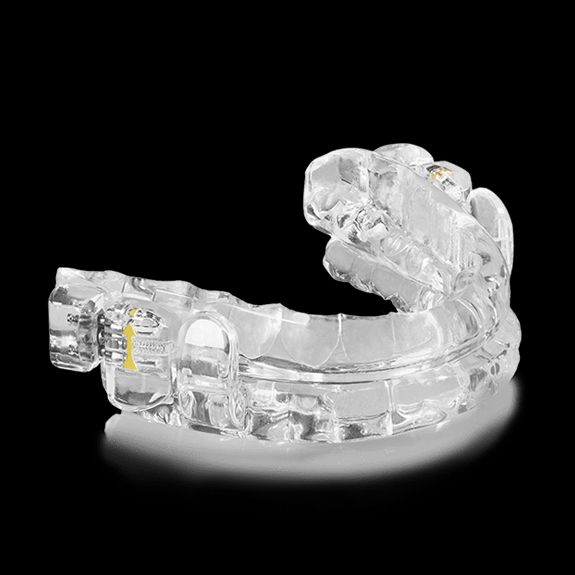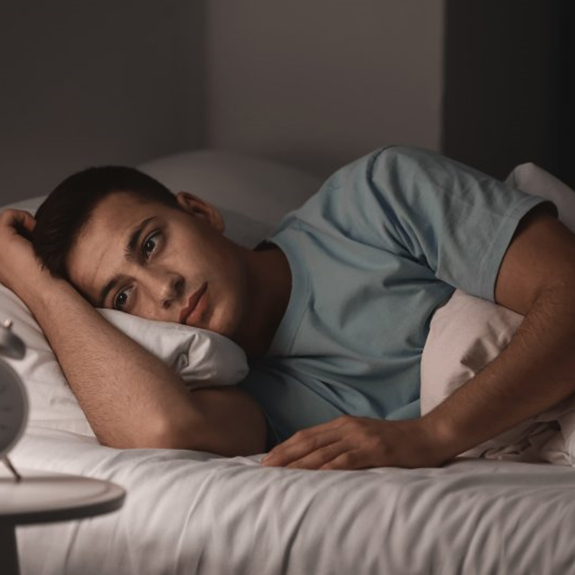Sleep Apnea Treatment – Dublin, OH
Snoring & Sleep Apnea Treatment in Dublin, OH
Are you tired, stressed out, or moody during the day? Do you catch yourself falling asleep at work or behind the wheel? Have complaints from your partner about your snoring put a strain on your otherwise healthy relationship? All of these are potential symptoms of a common but under-diagnosed sleep condition known as sleep apnea. Keep reading to learn more about sleep apnea treatment in Dublin, OH.
Why Choose Distinctive Smiles of Dublin for Snoring & Sleep Apnea Treatment?
- Fully Customized Oral Appliances
- Highly Trained, Knowledgeable Dentists
- Excellent Customer Service from Caring Team
What Is Sleep Apnea?

Patients who struggle with sleep apnea stop breathing throughout the night, often for 10 seconds or longer, leading to interruptions in deep sleep as they wake up to take a breath. As a result, getting a full night of rest is almost impossible.
Not every patient with sleep apnea wakes up completely. Some only move from a deep stage of sleep to a lighter stage. Because of this, a patient can be struggling with sleep apnea and not even know it.
That's why Dr. Buck of Distinctive Smiles of Dublin asks new and existing patients if they snore or have a bed partner that complains about their snoring, among other questions. Very often, snoring and sleep apnea have the same root cause, namely an obstruction of the airway caused by the tongue or lower jaw.
If you answer yes to our series of questions, we'll take the next step in diagnosing sleep apnea by giving you two written tests, the Epworth Sleepiness Scale and the STOP-Bang Questionnaire. Based on the numerical results of these, we can refer you to a trusted sleep physician, who will complete a sleep study with you.
Treating Snoring & Sleep Apnea

Depending on the results of your sleep study, the sleep physician will prescribe treatment with a CPAP machine or have us fabricate an oral appliance. Treatment with an oral appliance works by repositioning the tongue and lower jaw to keep the airway clear. With a custom-made oral appliance, we can help you claim the full night of rest you and your partner deserve.
Snoring & Sleep Apnea
One of the most common symptoms of sleep apnea is persistent snoring. However, just because someone snores does not automatically mean they have the condition. If the person snores and experiences symptoms like daytime fatigue, morning headaches, or mood/memory issues, then they should definitely come to see us for a sleep screening. These are all telltale signs of sleep apnea.
We also recommend that if someone has been told they snore most nights, they should let our team know. People who snore are much more likely to develop sleep apnea in the future, and minor lifestyle adjustments can prevent this from happening. We may also recommend giving a patient an oral appliance that will allow them to breathe better throughout the night and stop snoring, leading to better rest for them and anyone else in the area.
To learn more about how Dr. Buck can help you or a loved one overcome chronic snoring, sleep apnea, or another persistent sleep disorder, we invite you to visit our sleep apnea site.
Please Visit Our Sleep Apnea SiteSleep Apnea FAQs

Why Should I See a Dentist for Sleep Apnea Treatment?
Since dentists often specialize in upper respiratory health, you’ll want to consider visiting one for sleep apnea treatment. Those who are experts in obstructive sleep apnea (OSA) can usually provide effective treatment which involves repositioning the lower jaw to keep your airway from being obstructed due to your neck and mouth tissues. Furthermore, you can always discuss any sleep-related problems during your routine dental checkups, that way you can receive more comprehensive care for your oral and overall health.
Will Oral Appliance Therapy Make CPAP Therapy Unnecessary?
In the cases where a patient who’s experiencing mild to moderate sleep apnea feels a CPAP machine is difficult to use and uncomfortable, oral appliance therapy can make the former method unnecessary. CPAP treatment typically consists of wearing a mask that directly provides air through the airways, helping patients experience better sleep results. However, the machine is typically loud and bulky, so it comes as no surprise that only about 50% of prescribed users have trouble with compliance.
Can I Diagnose Sleep Apnea on My Own?
You won’t be able to diagnose yourself with sleep apnea on your own. Many symptoms can suggest the presence of this issue, but you can’t be certain about it unless you’ve undergone a professional sleep test. That’s why you’ll need to receive an official diagnosis from a sleep doctor, as sleep apnea comes in different forms and will need certain treatment approaches to confirm which kind you’re struggling with. Apple watches and other such devices can offer some useful data, but they won’t be as comprehensive as a sleep apnea test. To see if you have this condition, visit a qualified sleep doctor so they can confirm it and determine which kind you have.
Will Sleep Apnea Go Away If I Lose Weight?
Shedding some weight can sometimes improve or even fix sleep apnea. This is because excessive weight adds tissue to the neck area, which can result in the blocking of the airways and interrupting rest. Losing extra pounds around this area can help minimize the issue in the airway, allowing you to enjoy better sleep.
That said, being overweight is only one of many contributing factors to sleep apnea. In some cases, those who lose weight may still experience the condition, meaning there is likely one or more other reasons why they’re struggling with interrupted sleep. After losing any extra weight, it’s important to undergo another sleep test so your doctor can monitor your progress, determine the root cause of your condition, and develop a proper treatment plan for you.
I Need a Checkup & Cleaning I Need a Dentist for My Child I am Concerned About Bleeding Gums I Have a Cavity or Broken Tooth I am Missing One or More Teeth I Want to Enhance My Smile I Want a Straighter Smile I am Scared of the Dentist I am in Pain & Need Help I Have Pain in My Jaw View Our Services
